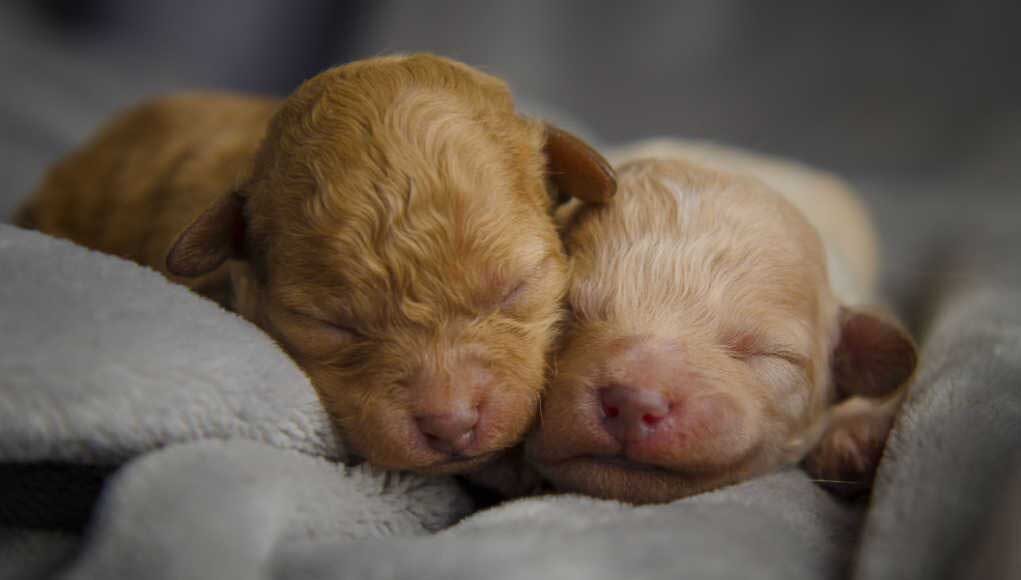Table of Contents
- When Do Puppies Open Their Eyes?
- Do Breeds Differ When Opening Their Eyes?
- Can We Help Puppies Open Their Eyes?
- How to Take Care of Your Puppy’s Eyes
- Eye Conditions in Puppies
- How to Prevent Eye Problems in Puppies
- What Happens If a Puppy is Born Blind?
- FAQs about When Do Puppies Open Their Eyes
- When Do Puppies Open Their Eyes: Final Thoughts
Puppies. Aren't they the cutest?
No one can resist a puppy's face, regardless of breed and size.
If you have newborn pups, I'm sure you just can't wait to get ahold of them! But you've probably noticed that their eyes are closed and appear to be always asleep.
So, when do puppies open their eyes?
When Do Puppies Open Their Eyes?
Puppies are born blind, deaf, and unable to control their body temperature. They come into the world vulnerable, relying on their mother to provide food and warmth.
Since dogs are an altricial species, they are born in an embryonic state. They are born with their eyes closed to protect the optic structures as they continue developing.
The eyes are not fully formed, although most can see some light, rapidly improving within their first few weeks of life.
Let's take a look at the stages of puppy eye development.
1–2 weeks
In the first few days, a puppy's vision is not as good as that of adults and older pups, with a range of only around a foot.
The eyes are still developing, although they can now see more details.
Your pup's vision is comparable to that of a pair of hazy glasses. While it can see motion and forms, it can have trouble perceiving fine details.
3–4 weeks
Your dog's eyesight will improve significantly in just another week.
It can now see nearby things but is unaware of color variations and struggles to handle light well.
5–6 weeks
It can now navigate and recognize familiar objects with enough vision. Your pooch will start to perceive color and develop a sense of depth.
Despite having a substantially greater vision, it relies more on scent than sight.
7–8 weeks
When your puppy's vision achieves complete maturity, that marks the end of the puppy eye development process.
Since their peripheral vision is completely developed at this age, they will rely more on sight than scent.
Do Breeds Differ When Opening Their Eyes?
Different breeds of puppies open their eyes at slightly different times.
Golden Retrievers, Cocker Spaniels, and German Shepherds are a few dog breeds that take 10 to 14 days.
Fox terrier puppies, on the other hand, could take up to 21 days for their eyes to open.
In general, puppies of smaller breeds may open their eyes before those of larger breeds. This might be the case since smaller canines tend to mature more quickly than large ones.
Naturally, there are exceptions, and each dog is unique. It all depends on each breed's timeline for eye development.
Remember that siblings might not open their eyes at the same time either.
Unless there are symptoms of an illness, there usually isn't a problem if one puppy is opening its eyes and the other isn't.
If you have any worries, ask your veterinarian when it would be best to schedule a visual exam.
Can We Help Puppies Open Their Eyes?
Puppies do not open their eyes immediately after birth as human newborns do.
All dogs have light-sensitive nerves in their eyes that transmit visual information to the brain.
However, because the nerves in a newborn puppy's eyes are too sensitive and underdeveloped, the eyelids remain closed to safeguard the eyes.
When the puppy is ready, it eventually opens its eyes, sometimes just one at a time.
Since they are largely immobile and spend much of their time sleeping and consuming their mother's milk, newborn puppies don't require vision right away.
In this case, remember to be patient. Puppies' eye development cannot be sped up or changed.
Their eyes will open when they are ready, not any earlier. If you force them open, you risk harming your dog's sight.
The only time you might need to intervene is if one of your puppies' eyes is swollen or if there is discharge oozing out of it.
Any swelling, bulging, discharge, pus, or other abnormalities may be signs of an infection that requires prompt medical attention.
How to Take Care of Your Puppy’s Eyes
You should have a basic understanding of puppy eye care.
The good news is that maintaining your puppy's eyes in good condition doesn't need much effort. Leave most of the caregiving to the mother.
To protect them from bright lights, keep puppies in an enclosed area.
You can keep your pup's eyes clean and soothe irritation by gently wiping away the crust from its eyes each morning with a damp cloth.
If your dog's eyes are inflamed or have foreign items in them, you can visually check them to make sure there aren't any additional symptoms of an issue.
Pay attention to eye infections.
The last thing your pooch needs at this crucial time is for conjunctivitis to set in. Conjunctivitis in dogs can result in lifelong blindness if neglected.
RELATED: Eye Infections in Dogs: Prevention and Treatment
Eye Conditions in Puppies
Though an infection can develop before a puppy's eyes fully open, ocular issues during the first few weeks of life are uncommon.
Puppies who are a little older are more susceptible to developing eye issues. Among the most typical problems are the following:
Corneal Wounds
Due to their lack of self-preservation, puppies often neglect to cover their eyes when playing with their siblings or rushing into the bush, which can irritate or scrape the cornea.
The large, protruding eyes of many toy and tiny breeds make them particularly vulnerable.
Bloodshot eyes, forcing the eye shut, and discharge indicate corneal injury.
Getting your puppy to the veterinarian as soon as you detect a corneal scratch is crucial to prevent any potential scarring.
To prevent potentially irreversible scarring, you must visit the veterinarian as soon as you suspect your puppy has a corneal scratch.
Entropion
This syndrome is when the puppy's eyelid folds in, rubbing the lashes against the cornea.
One of the most prevalent inherited eye conditions, entropion can affect both the top and bottom eyelids.
Squinting, keeping the eye shut, and frequent crying are symptoms. Only surgery can correct entropion; most dogs must wait until they are 6 to 12 months old for the procedure.
Dry Eye
Insufficient tear production results in dry eyes.
Reduced tear production can result in infection or corneal injury because tears lubricate the eye and remove foreign objects.
Excessive blinking, discharge, and pawing at the eye are symptoms.
Although not immediately harmful, dry eye can be extremely unpleasant and result in long-term harm if untreated.
In addition, a pup's eyes could appear foggy. This could mean your dog has cataracts, which are more frequent in older dogs, or could be a sign of an ulcer.
In some cases, the eyes may protrude out of their sockets. Exophthalmos is a term used to describe this condition, which can be a sign of kidney failure, thyroid disease, or liver disease.
Lastly, red or cherry eyes in puppies may indicate malignancy.
How to Prevent Eye Problems in Puppies
Fortunately, your puppy's eyes won't typically be impacted by their age. However, a variety of circumstances, such as the following, might cause eye issues in puppies:
- Genetics
- Environment
- Other medical issues
Genetics and the environment cannot be changed, but by maintaining good health, your dog will be less likely to develop eye issues.
Make sure your dog exercises enough each day.
It will be able to preserve healthy bones and muscles, especially those around their eyes. This has a significant impact on glaucoma and other disorders' prevention.
Your dog's food may also affect how well their eyes are doing. Give them premium dog food so they may get the right vitamins, minerals, and nutrients.
You must also provide your dog with the correct eye care, which includes routine cleanings. Wipe out the area with a cloth and warm water if you see any discharge.
Avoid cleaning your dog's eyes with any chemicals or disinfectants.
Planning for additional tests may be a good idea if you know your pup's family has a hereditary eye condition.
Get your pooch examined as soon as possible so you can take precautions to safeguard its eyes and stop any additional harm.
What Happens If a Puppy is Born Blind?
A blind puppy will remain blind if it is born blind. Blindness typically begins in the first two weeks of life.
Usually, an obstruction in the eye is the cause of it, but it could also be caused by infections and other medical conditions.
It can occasionally result from a genetic flaw. In either case, these circumstances won't alter, and your dog won't get normal eyes.
There are ways to assist a blind dog in adjusting to the outside world, though.
Your pup can explore by using other senses, such as its sense of smell. To help it understand how objects feel, you should also expose it to various textures.
Avoid isolating a blind puppy from the outside world because it can adapt and grow with your assistance just as effectively as any other pup.
FAQs about When Do Puppies Open Their Eyes
Should You Be Concerned if Your Puppy's Eyes Have Opened Too Soon?
Each dog is unique, but typically a puppy's eyes open between 10 and 14 days after birth.
If the puppy appears to be doing well and its eyes naturally opened a day or two earlier, this is probably nothing to worry about.
However, it can cause problems with their vision if a newborn puppy's eyes are opened to the outside world too soon.
To prevent permanent harm, the puppy should be examined by a veterinarian as soon as possible if:
- Eye was forced open
- The animal was born with open eyes
- The eyes opened much earlier than the 10-day mark
What Happens if Your Puppy's Eyes Are Still Closed After Two Weeks?
You can't always expect your puppy's eyes to open when they're supposed to because it's a process that doesn't follow a predetermined timeframe.
While most puppies open their eyes between 10 and 14 days, others may require a few more days.
After these 14 days, if your puppy's eyes haven't fully opened, you might need to phone your veterinarian to make an appointment to ensure it is not suffering from blindness or another illness.
What Should You Do if Your Puppy’s Eyes are Swollen?
Infection is most likely indicated by a protruding bulge under the sealed eye.
Most infections occur when bacteria enter the eye during delivery or when the puppy's eyes start opening.
The infection cannot drain out since the eyelids are shut, allowing it to persist.
Entrapped pus and swollen tissues are most likely the cause of the swelling.
To carefully open the eye, drain the fluid, and treat the infection, the puppy needs to be evaluated by a veterinarian. These infections can cause blindness if neglected.
What Week Do Puppies Start to Walk and Open Their Eyes?
They can see, hear, walk, urinate, and defecate independently when they are three to four weeks old.
Although their brains are still developing, puppies are capable of learning things. Still, these tiny creatures must be with their mother and littermates until they are eight to twelve weeks old.
What Should I Expect From a Week-Old Puppy?
Puppies are dependent on their mother for all of their needs and for a warm place to cuddle up in because they are born blind, deaf, and unable to control their body temperature.
They will spend their entire first week napping and eating to gain weight and build strength.
When Do Puppies Open Their Eyes: Final Thoughts
Around 10 or 14 days after birth, newborn puppies often open their eyes for the first time.
This is the period required for the complete development of a puppy's optical nerves.
A newborn puppy's sensitivity to light, particularly bright light, is quite acute before its eyes open.
So as not to irritate its eyes, you should keep your pup somewhere that isn't overly illuminated.
Since they can smell the mother dog and consume her milk, puppies don't need to see anything until they are around two weeks old.
The strongest sense in a dog is smell, which remains strong long after the dog opens its eyes.
Dog owners must ensure that these fluffballs are in a secure location with their mothers and littermates during this vulnerable period.


















